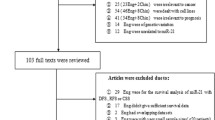Abstract
Recent studies have shown that microRNAs (miRNA) exhibit altered expression levels in cancers, and they may be considered as valuable prognostic biomarkers for patients with cancers. We performed this meta-analysis to provide a comprehensive evaluation of the role of miRNA-100 expression on the overall survival rate by calculating the pooled hazard ratio (HR) for overall survival (OS), which compared the high and low expression levels of miR-100 in patients of the available studies. Finally, a total of six studies dealing with various carcinomas were involved for this meta-analysis. The results indicated that lower expression of miR-100 in cancerous tissue could significantly predict poorer survival in various carcinomas with the pooled HR of 2.19 (95 % CI 1.49–3.24, P = 0.0007). In conclusion, the findings from this present meta-analysis suggest that miR-100 expression is associated with OS in cancer patients and could be a useful clinical prognostic factor for those patients.



Similar content being viewed by others
References
Yang W, Lee DY, Ben-David Y. The roles of microRNAs in tumorigenesis and angiogenesis. Int J Physiol Pathophysiol Pharmacol. 2011;3:140–55.
Osman A. MicroRNAs in health and disease—basic science and clinical applications. Clin Lab. 2012;58:393–402.
Roberts AP, Lewis AP, Jopling CL. The role of microRNAs in viral infection. Prog Mol Biol Transl Sci. 2011;102:101–39.
Zheng B, Liang L, Huang S, Zha R, Liu L, Jia D, et al. Microrna-409 suppresses tumour cell invasion and metastasis by directly targeting radixin in gastric cancers. Oncogene. 2012;31:4509–16.
Zheng B, Liang L, Wang C, Huang S, Cao X, Zha R, et al. Microrna-148a suppresses tumor cell invasion and metastasis by downregulating rock1 in gastric cancer. Clin Cancer Res. 2011;17:7574–83.
Berardi E, Pues M, Thorrez L, Sampaolesi M. MiRNAs in ESC differentiation. Am J Physiol Heart Circ Physiol. 2012;303:H931–9.
Iorio MV, Croce CM. MicroRNA dysregulation in cancer: diagnostics, monitoring, and therapeutics. A comprehensive review. EMBO Mol Med. 2012;4:143–59.
Roy S, Sen CK. MiRNA in wound inflammation and angiogenesis. Microcirculation. 2012;19:224–32.
Jansson MD, Lund AH. MicroRNA and cancer. Mol Oncol. 2012;6:590–610.
Huang L, Lin JX, Yu YH, Zhang MY, Wang HY, Zheng M. Downregulation of six microRNAs is associated with advanced stage, lymph node metastasis, and poor prognosis in small cell carcinoma of the cervix. PLoS One. 2012;7:e33762.
Liu J, Lu KH, Liu ZL, Sun M, De W, Wang ZX. Microrna-100 is a potential molecular marker of non-small cell lung cancer and functions as a tumor suppressor by targeting polo-like kinase 1. BMC Cancer. 2012;12:519.
Peng DX, Luo M, Qiu LW, He YL, Wang XF. Prognostic implications of microrna-100 and its functional roles in human epithelial ovarian cancer. Oncol Rep. 2012;27:1238–44.
Wang S, Xue S, Dai Y, Yang J, Chen Z, Fang X, et al. Reduced expression of microrna-100 confers unfavorable prognosis in patients with bladder cancer. Diagn Pathol. 2012;7:159.
Chen P, Zhao X, Ma L. Downregulation of microrna-100 correlates with tumor progression and poor prognosis in hepatocellular carcinoma. Mol Cell Biochem. 2013;383:49–58.
Wang G, Chen L, Meng J, Chen M, Zhuang L, Zhang L. Overexpression of microrna-100 predicts an unfavorable prognosis in renal cell carcinoma. Int Urol Nephrol. 2013;45:373–9.
Bai J, Guo A, Hong Z, Kuai W. Upregulation of microrna-100 predicts poor prognosis in patients with pediatric acute myeloid leukemia. Onco Targets Ther. 2012;5:213–9.
Bradburn MJ, Deeks JJ, Berlin JA, Russell Localio A. Much ado about nothing: a comparison of the performance of meta-analytical methods with rare events. Stat Med. 2007;26:53–77.
Tierney JF, Stewart LA, Ghersi D, Burdett S, Sydes MR. Practical methods for incorporating summary time-to-event data into meta-analysis. Trials. 2007;8:16.
Higgins JP, Thompson SG, Deeks JJ, Altman DG. Measuring inconsistency in meta-analyses. BMJ. 2003;327:557–60.
Zhang Y, Wang Z, Chen M, Peng L, Wang X, Ma Q, et al. Microrna-143 targets macc1 to inhibit cell invasion and migration in colorectal cancer. Mol Cancer. 2012;11:23.
Hong L, Han Y, Li S, Yang J, Zheng J, Zhang H, et al. The malignant phenotype-associated microRNA in gastroenteric, hepatobiliary, and pancreatic carcinomas. Expert Opin Biol Ther. 2010;10:1693–701.
Lee S, Vasudevan S. Post-transcriptional stimulation of gene expression by microRNAs. Adv Exp Med Biol. 2013;768:97–126.
Lovat F, Valeri N, Croce CM. MicroRNAs in the pathogenesis of cancer. Semin Oncol. 2011;38:724–33.
Liu J, Zheng M, Tang YL, Liang XH, Yang Q. MicroRNAs, an active and versatile group in cancers. Int J Oral Sci. 2011;3:165–75.
Zeng Y, Qu X, Li H, Huang S, Wang S, Xu Q, et al. MicroRNA-100 regulates osteogenic differentiation of human adipose-derived mesenchymal stem cells by targeting bmpr2. FEBS Lett. 2012;586:2375–81.
Shi W, Alajez NM, Bastianutto C, Hui AB, Mocanu JD, Ito E, et al. Significance of plk1 regulation by mir-100 in human nasopharyngeal cancer. Int J Cancer. 2010;126:2036–48.
Oliveira JC, Brassesco MS, Morales AG, Pezuk JA, Fedatto PF, da Silva GN, et al. MicroRNA-100 acts as a tumor suppressor in human bladder carcinoma 5637 cells. Asian Pac J Cancer Prev. 2011;12:3001–4.
Dahiya N, Sherman-Baust CA, Wang TL, Davidson B, Shih IM, Zhang Y, et al. MicroRNA expression and identification of putative miRNA targets in ovarian cancer. PLoS One. 2008;3:e2436.
Conflicts of interest
None
Author information
Authors and Affiliations
Corresponding author
Additional information
Jie Chen, Biqiang Zheng, and Chunmeng Wang contributed equally to this work.
Rights and permissions
About this article
Cite this article
Chen, J., Zheng, B., Wang, C. et al. Prognostic role of microRNA-100 in various carcinomas: evidence from six studies. Tumor Biol. 35, 3067–3071 (2014). https://doi.org/10.1007/s13277-013-1398-3
Received:
Accepted:
Published:
Issue Date:
DOI: https://doi.org/10.1007/s13277-013-1398-3




